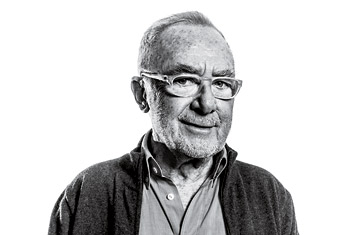
Your new series of paintings and the book about them, Patterns, depict rows of thin stripes. How did you create them?
I played. My friend bought a painting, and he bought me a good reproduction--a wonderful poster. And it attracted me. I started to play with a mirror. I doubled and shrank and divided and mirrored and divided. It was like a gift which I didn't design. I like it a lot when I get something by chance.
How would you respond to people who say they look like wrapping paper?
They are right. It's very decorative. I am fascinated by [composer] John Cage, and he says it well: "I have nothing to say, so I say it." Customs agents asked me at the airport, "What do you do?" and I said, "I have a show here." And I showed them the invitation, and they said, "Meh, Christmas box." We had fun.
So craft isn't important in painting or making art?
At the moment, it's not important at all. We've lost these qualities, these abilities to do something by hand. Some illustrators have it still, but it's just not art. We have photography. We have cameras and computers that do it better and faster.
Are you optimistic about the future of painting?
Sometimes, yes. People won't stop painting, just as they won't stop making music or dancing. This is a facility we have. Children don't stop doing it or having it. On the other hand, it seems we don't need painting anymore. Culture is more interested in entertaining people. Every museum is full of nice things. That's the opposite of before. It was important things or serious things. Now we have interesting things.
Growing up in Germany, you had to join the junior version of Hitler Youth. What was that like?
My situation was not typical. I was in this little village on the border of Czechoslovakia. The group was not very serious. I was proud of this nice uniform I had, with this belt. It was just like the Cub Scouts, not so dangerous.
As a teacher, your father was required to be a member of the National Socialist Party. How did that play out after the war?
My father was an absolute pacifist, but he had to join. [After the war] nobody who had been a teacher could teach again. He had to do something else to get a bit of money for us. And we had only really young teachers. You cannot miss your father as a teacher, but at home I missed him.
So how was your relationship?
It was difficult for the whole generation. These fathers were away six years — mine more because he was a prisoner of war. When he came home after seven years, we asked, "What are you doing here? You are not a member of this family anymore." It was hard for him and for us. We were a strange family.
After you defected from East Germany in 1961, you wrote to your art professor, asking forgiveness for leaving. Did he grant it?
He was Jewish and a communist, and he liked me. He helped me get permission to visit West Germany. And he trusted me. I know that he was not satisfied with the system. He couldn't answer me. I never heard from him again.
Do you feel, because people love your figurative photorealistic works like the Candle series so much, more pressure to move in that direction?
No. The abstract paintings are actually more expensive.
What art do you own?
I am not a collector. It would make no sense to have it. I love to see it when I come to a museum or to a show, but there's no need to own it.
FOR VIDEO OF OTHER INTERVIEWEES, GO TO time.com/10questions
